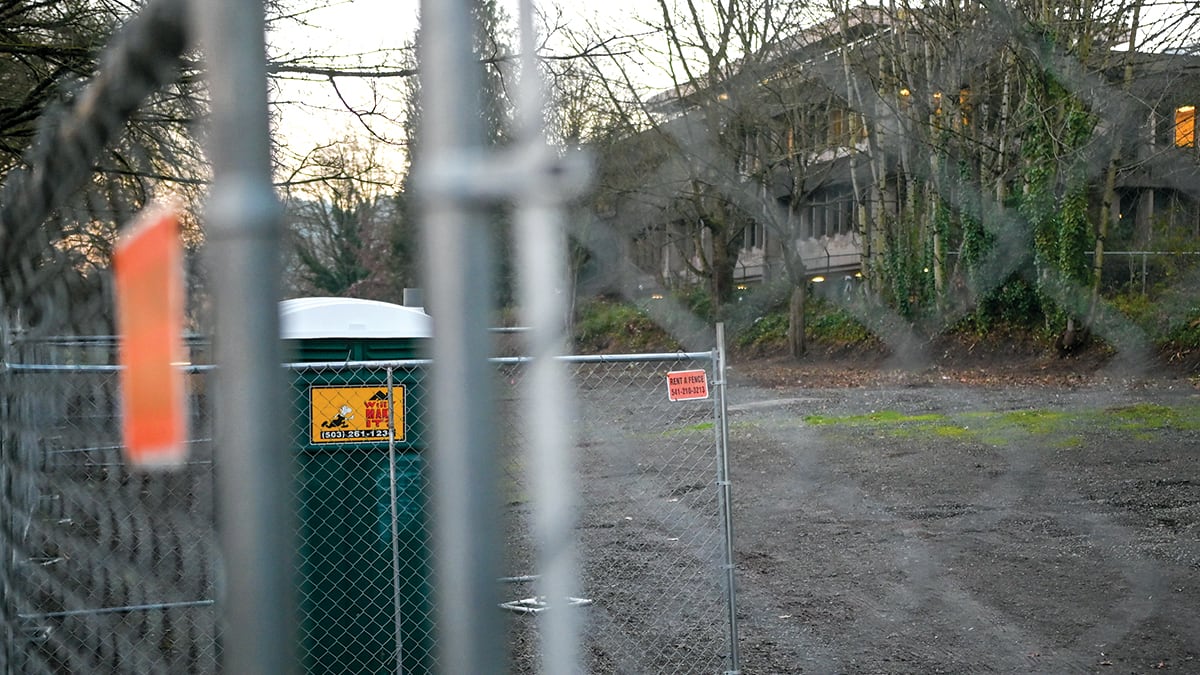It’s been eight months since City Commissioner Dan Ryan pledged to open six “safe rest villages” across the city as an alternative to street camping. In that time, his office has selected only three locations. As the clock ticks on Ryan’s pledge, we examine the status of one of the three sites Ryan has selected.
Location: 2300 SW Naito Parkway
What’s there now: A strip of gravel now surrounded by construction fencing. The property is co-owned by the Portland Bureau of Transportation and the Oregon Department of Transportation.
Status: It’s further along than a similar site in Multnomah Village, which WW examined last week. That’s in part because the Naito site is absorbing the contractor and residents of an existing homeless village across the Willamette River.
City officials confirmed to nearby stakeholders on Jan. 31 that the Queer Affinity village, which was founded by the city and county on the inner eastside but is being displaced by development, will be moved to the 2300 block of Naito Parkway and will still be run by its current contractor, the nonprofit All Good Northwest.
That’s not a surprise: Five months ago, Ryan’s office said one of the six villages would be a relocation of the displaced Queer Affinity village. But it means the site will be limited to people who identify as LGBTQ+, and would increase citywide shelter capacity only modestly.
The city is currently clearing blackberries and brush and leveling the ground in preparation for permits. Ryan’s office still hasn’t requested those permits from the city.
Who stands in the way: Leaders at two schools adjacent to the location created a stakeholder group for the site, including representatives from two neighborhood associations.
In October, the stakeholder group presented six demands to the city and has since whittled them down to two. “Our entire team recognizes and appreciates their concerns, though many of their conditions are simply not feasible,” says Bryan Aptekar, who handles communications for the safe rest villages. “We’ve been consistent with our answers since they were first asked.”
The stakeholders’ two key demands, which have so far been denied by the city: Give priority residency to campers already living within the downtown neighborhood’s boundaries and let us have a role in referring them, and ban camping around the site’s perimeter.
Beven Byrnes, the principal at Bridges Middle School, says the school’s support of the site is conditioned on those demands. If they’re not met, she warns that families from the two schools will launch a media campaign to pressure the city to meet the demands.
“Between two schools, we have hundreds of influential family members who can and will flood the commissioners and do a media campaign,” Byrnes says. “If conditions don’t improve, our school would be in a position to relocate.”
What Ryan says: Ryan tells WW he’s “exploring options” that could limit unsanctioned camping around the villages “to ensure the safety and stability of those in the shelter, and for those who live, work and play near them.”
Bodo Heiliger, head of school at the International School of Portland, says he wants the city to enforce existing city laws that prohibit campers from pitching tents within 150 feet of schools. Heiliger says Ryan has “spoken of potential new camping zones,” but he adds, “What we hear from Ryan and what we hear from the team aren’t exactly in line.”
This article was published with support from the Jackson Foundation, whose mission is: “To promote the welfare of the public of the City of Portland or the State of Oregon, or both.”

